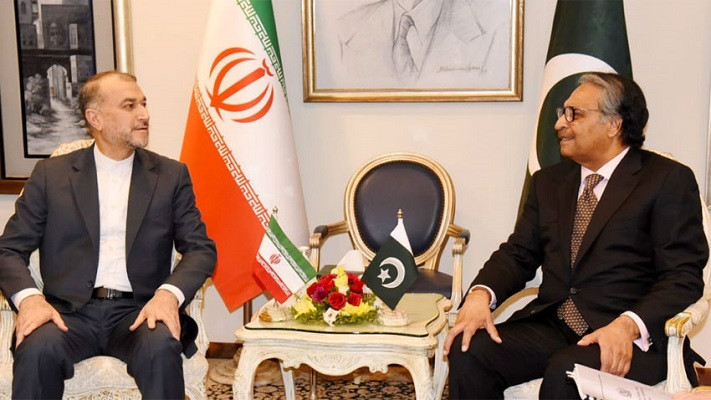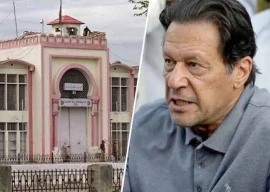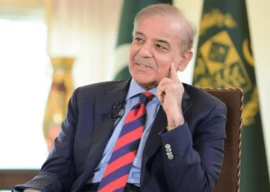
Iranian Foreign Minister Hossein Amir Abdollahian asserted on Monday that there was "no doubt" that militants positioned in the border regions of both Pakistan and Iran were "led and supported by third countries".
Abdollahian’s visit came as the two countries reeled from unprecedented missile exchanges a fortnight ago, and the killing of nine Pakistani labourers in the Sistan-Blauchistan province of Iran on Saturday.
During a joint press conference in Islamabad with interim Foreign Minister Jalil Abbas Jilani, Abdollahian emphasized the alleged involvement of third-party support for terrorists operating along the common border of Iran and Pakistan.
He stated, "There is no doubt that the terrorists located in the common border regions and areas of Iran and Pakistan are led and supported by third countries and they never favour any good action in line with the benefits of the Iranian and Pakistani governments and nations."
🔴LIVE: Joint Press Stakeout between the Foreign Ministers of Pakistan and Iran https://t.co/NCvDjyYCef
— Spokesperson 🇵🇰 MoFA (@ForeignOfficePk) January 29, 2024
Abdollahian, at the beginning of his speech, underscored that Iran and Pakistan "never had territorial differences". He pointed to their historical relations, describing them as representing a single nation located in two distinct geographical positions.
Acknowledging an invitation for Iranian President Ebrahim Raisi to visit Pakistan, the minister highlighted the mutual respect for each other's sovereignty and territorial integrity. Abdollahian unequivocally stated that both countries would not provide any opportunity for terrorists to threaten their common security.
“We are here, so in a loud voice we will tell all terrorists that Iran and Pakistan will not provide them with any opportunity to endanger our common security,” he stated.
He disclosed that both sides agreed to prompt actions regarding border security, the necessity of combating terrorism, and the expansion of trade, commercial, and economic cooperation. The minister emphasized the joint commitment of Iran and Pakistan to take further measures in these areas as soon as possible.
High-level mechanism
Islamabad's top diplomat said the two sides have also agreed to “establish a high-level constructive mechanism at the level of foreign ministers of the two countries”.
Elaborating further, Jilani said the mechanism will meet alternatively in both Iran and Pakistan "on a regular basis to oversee the progress that is being made in various areas of cooperation”.
He further said that both Islamabad and Tehran have agreed to “cooperate to fight terrorism in our respective areas”. “We have agreed to station liaison officers of which an agreement was already in place at the earliest date," said the foreign minister, adding that they would be stationed in Turbat and Zahedan.
Appreciating his Iranian counterpart's visit at "such short notice", Jilani said it testifies to the deep commitment both sides have to solidify ties with each other. Close ties between Pakistan and Iran were “not only beneficial for development but an important source of stability for the people”.
“Respect for sovereignty and integrity remains the foundational step for cooperation," stressed FM Jilani and added that Islamabad and Tehran have also agreed upon “adopting collaborative approaches to confront this menace to leverage the robust institutional mechanism”.
Strengthening bilateral cooperation
In a meeting held earlier in the day, Jilani and his Iranian counterpart agreed to strengthen relations further as the two sides discussed bilateral cooperation.
Both sides "underscored the importance of robust dialogue and cooperation as the pathway for a positive, forward-oriented, and upward trajectory in bilateral relations".
Foreign Minister @JalilJilani and Iranian Foreign Minister @Amirabdolahian meet at the Ministry of Foreign Affairs and discussed bilateral cooperation between Pakistan and Iran. They underscored the importance of robust dialogue and cooperation as the pathway for a positive,… pic.twitter.com/LuJeS8NBU9
— Spokesperson 🇵🇰 MoFA (@ForeignOfficePk) January 29, 2024
Islamabad and Tehran also agreed to work towards promoting the mutually desired goals of peace and prosperity, based on mutual respect and a collective approach to address common challenges.
Tit-for-tat missile strikes
An unusual military standoff was triggered by Iran’s missile strikes on January 16, targeting what it claimed were hideouts of Jaish-al-Adl in the remote region of Balochistan. The Jaish-al-Adl, formed in 2012, is a militant group involved in several attacks on the Iranian security forces.
Two days later Pakistan mounted its reply, hitting what it said were terrorist bases of Baloch militant outfits. Iran admitted those killed in the Pakistan strikes were not Iranian nationals.
Following Pakistan’s retaliation, the two sides were quick to climb down the escalation ladder. Ahead of the Iranian foreign minister’s visit, the ambassadors of Iran and Pakistan returned to their respective assigned capitals last week.
The two countries have often boasted of their “friendly and brotherly” ties but underneath do exist certain problems. The major issue is the presence of non-state actors in the border region which has been the cause of mistrust.
But despite that, very few had thought Iran would resort to missile strikes in Pakistan. Officials said that both sides would now need to move cautiously and agree on a new framework that ensures such incidents did not happen in the future.

















COMMENTS
Comments are moderated and generally will be posted if they are on-topic and not abusive.
For more information, please see our Comments FAQ